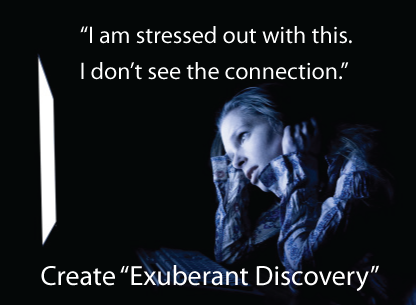Synthesis:
Loneliness is inherent in traditional eLearning. The use of the story-based approach allows learners the opportunity to have a stress-free and comfortable learning environment that promotes independent discovery. __________________________________________________________________________

There is a certain degree of “Learner Loneliness” inherent in eLearning, in spite of our efforts to engage learners with multimedia, games, social learning interactions and mobile learn-as-you-need tools.
Is it possible that we have become overly dependent on technologies and so have deprived our learners and even ourselves of meaningful interaction?
Sherry Turkle reminds us in her book “Alone Together” about this issue.
“We turn to other people in order to feel less anxious or in order to feel alive. If we’re not able to be alone, we’re going to be more lonely. We expect more from technology and less from each other. We’re lonely but we’re afraid of intimacy.”
Sherry Turkle (2012)
I found an interesting research that helped me further connect the very ideas on why Story-Based eLearning Design helps make elearning more meaningful.
Judy Willis writes in Psychology Today and “The Neuroscience of Joyful Education:”
[W]hen we scrub joy and comfort from the classroom, we distance our students from effective information processing and long-term memory storage. Instead of taking pleasure from learning, students become bored, anxious, and anything but engaged…
My own experience as a neurologist and classroom teacher has shown me the benefits of joy in the classroom. Neuroimaging studies and measurement of brain chemical transmitters reveal that students’ comfort level can influence information transmission and storage in the brain (Thanos et al., 1999). When students are engaged and motivated and feel minimal stress, information flows freely through the affective filter in the amygdala and they achieve higher levels of cognition, make connections, and experience “aha” moments. Such learning comes not from quiet classrooms and directed lectures, but from classrooms with an atmosphere of exuberant discovery (Kohn, 2004).
The idea of having an “atmosphere of exuberant discovery” reminded me about my blog posts on “instant learning.” Willis suggests, among other ideas, that making educational experience relevant helps create comfortable learning environments which are free of stress and anxiety. Willis provides interesting examples which have very practical values in eLearning design:
“… when students know the metric to standard measurement conversions, they can “translate” a recipe from a cookbook that uses metric measures into the quantities they need in U.S. standard measurements to prepare cookie dough in class.”
“Similarly, problems about interest rates can relate to purchasing something the students would want to buy, such as an iPod or new sneakers. Students can learn about decimal place values by calculating batting averages to the thousandth place.”
These examples brought me back to the core ideas I proposed in making technical learning more relevant.
Please see Making Technical & Compliance Learning Engaging & Fun.
Instead of just presenting technical facts, we need to design eLearning that creates the context and meaning of the facts with the real-life situation of the learners.
RAD
I suggest you read Judy Willis full article on RAD The acronym RAD should remind educators of three important neuroscience concepts to consider when preparing lessons:
- Novelty promotes information transmission through the Reticular activating system.
- Stress-free classrooms propel data through the Amygdala’s affective filter.
- Pleasurable associations linked with learning are more likely to release more Dopamine.
Discovery
Another idea that July Willis suggests is to allow independent discovery:
“Thanks to dopamine release and the consolidation of relational memories, students are more likely to remember and understand what they learn if they find it compelling or have a part in figuring it out for themselves. In addition, when students have some choices in the way they will study or report on something, their motivation will increase and stress will diminish. They will be more accepting of their errors, motivated to try again, and less self-conscious about asking questions.”
My insight
As I continue to clarify in my mind how to create better eLearning with Story-Based Design approaches, the more I am convinced that the role of context and discovery continue to reinforce the fact that stories possess the greatest potential in making our elearning programs less cold, distant and lonelier for the learner; providing them with more warm, stress-free, pleasurable and comfortable learning environments that cultivates deeper learning.
Summary:
Learner loneliness comes unbidden in traditional eLearning. However, the implementation of the unique story-based approach provides a rich backdrop where learners are allowed to roam free, discover answers to their own questions and make choices on how they accept information. The journey keeps them motivated enough to experience authentic learning relevant to their context and situation. Stories almost always guarantee the exuberant discovery of embedded content those results to a most stimulating learning experience.
